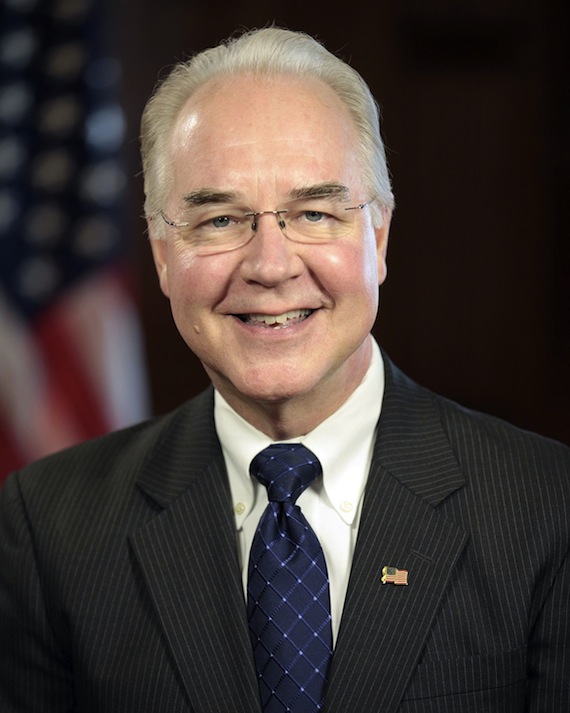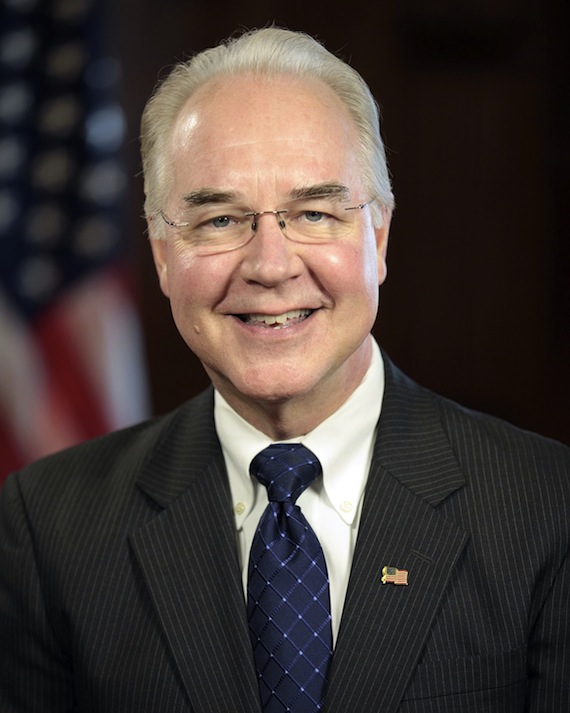By Robert Faturechi | (ProPublica)
Former U.S. Attorney Preet Bharara, who was removed from his post by the Trump administration last week, was overseeing an investigation into stock trades made by the president’s health secretary, according to a person familiar with the office.
Tom Price, head of the Department of Health and Human Services, came under scrutiny during his confirmation hearings for investments he made while serving in Congress. The Georgia lawmaker traded hundreds of thousands of dollars worth of shares in health-related companies, even as he voted on and sponsored legislation affecting the industry.

Price testified at the time that his trades were lawful and transparent. Democrats accused him of potentially using his office to enrich himself. One lawmaker called for an investigation by the Securities and Exchange Commission, citing concerns Price could have violated the STOCK Act, a 2012 law signed by President Obama that clarified that members of Congress cannot use nonpublic information for profit and requires them to promptly disclose their trades.
The investigation of Price’s trades by the U.S. Attorney’s Office for the Southern District of New York, which hasn’t been previously disclosed, was underway at the time of Bharara’s dismissal, said the person.
Bharara was one of 46 U.S. attorneys asked to resign after Trump took office. It is standard for new presidents to replace those officials with their own appointees. But Bharara’s firing came as a surprise because the president had met with him at Trump Tower soon after the election. As he left that meeting, Bharara told reporters Trump asked if he would be prepared to remain in his post, and said that he had agreed to stay on.
When the Trump administration instead asked for Bharara’s resignation, the prosecutor refused, and he said he was then fired. Trump has not explained the reversal, but Bharara fanned suspicions that his dismissal was politically motivated via his personal Twitter account.
“I did not resign,” he wrote in one tweet over the weekend. “Moments ago I was fired.”
“By the way,” Bharara said in a second tweet, “now I know what the Moreland Commission must have felt like.”
Bharara was referring to a commission that was launched by New York Gov. Andrew Cuomo in 2013 to investigate state government corruption, only to be disbanded by the governor the next year as its work grew close to his office. In that case, Bharara vowed to continue the commission’s work, and eventually charged Cuomo associates and won convictions of several prominent lawmakers.
Bharara referred questions from ProPublica to the U.S. attorney’s office in the Southern District of New York. A spokesperson there declined to comment. The Justice and Health and Human Services departments also didn’t respond to requests for comment.
A White House spokesperson didn’t respond to questions about whether Trump or anyone in his cabinet was aware of the inquiry into Price’s trades.
In December, the Wall Street Journal reported that Price traded more than $300,000 worth of shares in health companies over a recent four-year period, while taking actions that could have affected those companies. Price, an orthopedic surgeon, chaired the powerful House Budget Committee and sat on the Ways and Means Committee’s health panel.
In one case, Price was one of just a handful of American investors allowed to buy discounted stock in Innate Immunotherapeutics — a tiny Australian company working on an experimental multiple sclerosis drug. The company hoped to be granted “investigational new drug” status from the Food and Drug Administration, a designation that expedites the approval process.
Members of congress often try to apply pressure on the FDA. As ProPublica has reported, Price’s office has taken up the causes of health care companies, and in one case urged a government agency to remove a damaging drug study on behalf of a pharmaceutical company whose CEO donated to Price’s campaign.
Innate Immunotherapeutics’ CEO Simon Wilkinson told ProPublica that he and his company have not had any contact with American law enforcement agencies and have no knowledge of authorities looking at Price’s stock trades.
Another transaction that drew scrutiny was a 2016 purchase of between $1,001 and $15,000 in shares of medical device manufacturer Zimmer Biomet. CNN reported that days after Price bought the stock, he introduced legislation to delay a regulation that would have hurt Zimmer Biomet.
Price has said that trade was made without his knowledge by his broker.
In a third case, reported by Time magazine, Price invested thousands of dollars in six pharmaceutical companies before leading a legislative and public relations effort that eventually killed proposed regulations that would have harmed those companies.
Louise Slaughter, a Democratic Congress member from New York who sponsored the STOCK Act, wrote in January to the SEC asking that the agency investigate Price’s stock trades. “The fact that these trades were made and in many cases timed to achieve significant earnings or avoid losses would lead a reasonable person to question whether the transactions were triggered by insider knowledge,” she wrote.
What federal authorities are looking at, including whether they are examining any of those transactions, is not known.
Along with the Price matter, Bharara’s former office is investigating allegations relating to Fox News, and has been urged by watchdog groups to look into payments Trump has received from foreign governments through his Manhattan-based business. Bharara’s former deputy, Joon Kim, is now in charge of the office, but Trump is expected to nominate his replacement within weeks.
ProPublica reporters Jesse Eisinger and Justin Elliott and research editor Derek Kravitz contributed to this story.
ProPublica is a Pulitzer Prize-winning investigative newsroom. Sign up for their newsletter.



 © 2025 All Rights Reserved
© 2025 All Rights Reserved